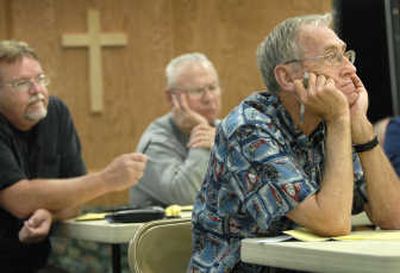Ministers meet to confront abuse

Despite the trauma of a sex abuse crisis and the ordeal of Chapter 11 bankruptcy, hope endures for the Catholic Diocese of Spokane.
“Help us to be good stewards of this moment,” prayed Bishop William Skylstad of Spokane. “Help us see – in all this tragedy – grace and hope and new life.”
Amid all the pain, there were lessons to learn, the bishop told a gathering of about 40 Protestant pastors Thursday. “When reality surfaces, healing can begin,” he said.
Skylstad’s presentation at the Spokane Valley Nazarene Church was part of a seminar addressing the problem of sexual abuse in the community. As the Diocese of Spokane emerges from its scandal and bankruptcy, Skylstad and others are sharing their experience to help other religious leaders protect children and prevent abuse in their own churches.
“It has been quite a journey,” Skylstad said. “It’s been painful. It’s been hard. … We have harmed the image of the church. I want to apologize to you for the way the name ‘Christian’ has been weakened.”
While the Catholic Church has been under scrutiny in recent years, sexual abuse of children isn’t just a Catholic problem, said the Rev. Ian Robertson, the retiring senior pastor at Spokane Valley Nazarene Church. It can affect any church of any denomination, he said. It’s also not just a church problem. In society as a whole, it’s a tragedy that hurts as many as one in five girls and one in seven to eight boys.
About a year ago, Robertson and the Rev. Chuck Wilkes, also of Spokane Valley Nazarene Church, decided they needed to reach out to their Catholic brothers and sisters and to learn from past mistakes. So they started talking to other church leaders, particularly those in Spokane Valley. Along with three other Spokane area pastors – Joe Wittwer of Life Center, John Repsold of Fourth Memorial and Monte LeLaCheur of First Church of the Open Bible, Robertson also started meeting regularly with Skylstad to offer friendship and support.
As a result of those meetings, the roughly 33 pastors who belong to the Spokane Valley Ministerial Association have launched an initiative known as “Healing to Our Community.” As part of that effort to reach out to victims of sexual abuse and to help protect children, Robertson, Skylstad and others have put together a seminar called “Becoming a Healing Church for Our Hurting Community.”
About 60 people attended the first gathering on Tuesday this week. Thursday’s seminar drew pastors from all over the region, including some from as far as Stevens County and Priest River, Idaho.
“How can we turn this tragedy into triumph?” asked Robertson, reflecting on the experience of the Diocese of Spokane. “How can we as Christians work together? We don’t have all the answers. There is no simple fix, but the time has come to begin the dialogue.”
On Thursday, Skylstad and Shaun Cross, the lead attorney in the diocese’s bankruptcy case, became the experts on the topic of preventing sex abuse. Marcia Black-Gallucci, a legal advocate/crisis intervention specialist for the Victim Rights Response Team of Lutheran Community Services, also came to discuss how pastors can respond to people who have been sexually abused.
“Victims have been profoundly hurt,” said Skylstad, who shared his experience meeting with adults who broke down in tears as they recalled the pain they suffered as children at the hands of priests.
The bishop also talked about the loss experienced by people in the pews and by priests, whose reputations have been tarnished as a result of the crimes committed by just a few.
There was “a sickness in the church,” he said, describing the secrecy surrounding sexual abuse. “Thanks be to God, we have now recognized some of the red flags of danger,” the signs that are indicative of an abuser, he said.
Still, despite all the pain, “I am truly grateful that all of this has to come to light,” said Skylstad, detailing how roughly 180 people have come forward to report childhood sexual abuse – a total that the bishop said he never imagined several years ago.
Cross, in describing his experience as the diocese’s bankruptcy attorney, said, “as a Christian … it has been the greatest burden that I have ever carried.” It was more than just money, he said; “this dealt with people’s faith, their souls, with shattered faith and shattered lives.”
Cross – a member of Christ The Redeemer, an evangelical church in Spokane – also spoke about how his own prayer life and Bible study not only helped him get through the challenges of the diocese’s case, but also brought him closer to God.
He stressed that the Chapter 11 was a success because it provided finality and a forum for victims to come forward with confidentiality. In the end, about 180 victims will receive a total of $41 million. “The plan will not heal one person,” Cross said. “Only God’s grace will do that.”
As a result of the sex abuse scandal in the Roman Catholic Church, the Diocese of Spokane has adopted numerous policies to ensure the protection of children and vulnerable adults. Many of the regulations – which include outside audits, extensive training and a code of conduct that explicitly defines inappropriate behavior to include wrestling, piggy-back rides and massages – are now being emphasized by other churches in the area, particularly in Spokane Valley.
“Only in the last three years have I come to know what a cross means,” the bishop said. “… Our experience has been sad and tragic, but we build upon it with hope and a new world.”